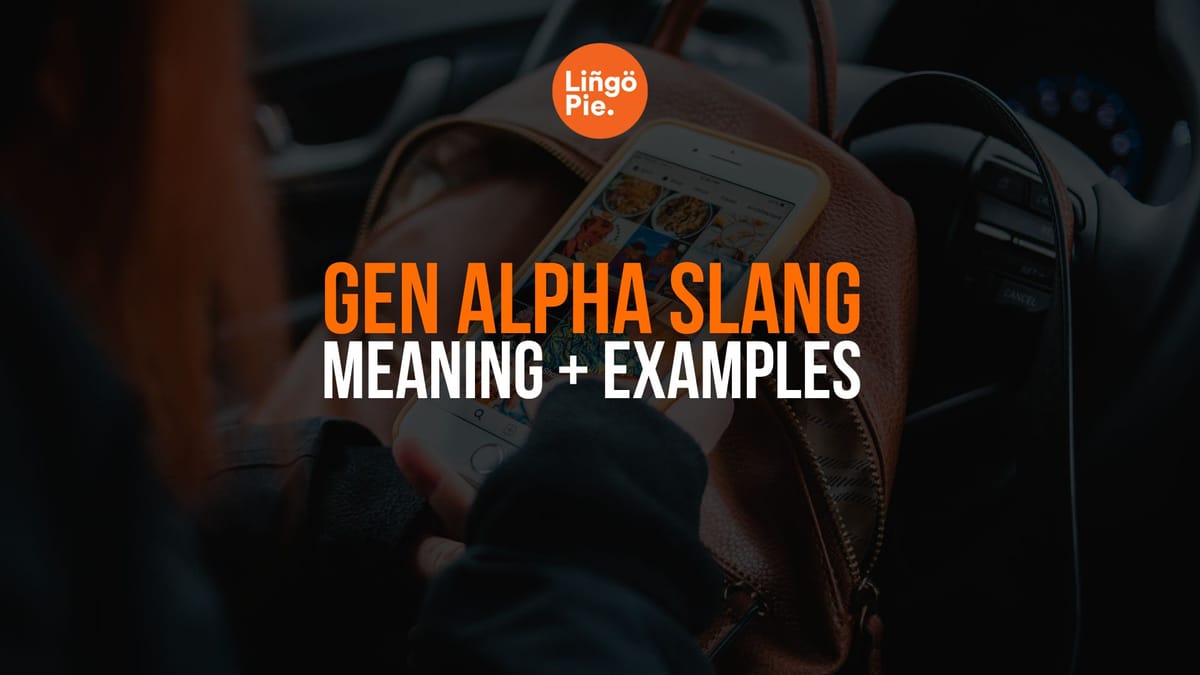Language moves fast, but slang? It sprints. The slang words of 2024 have evolved at breakneck speed, shaped by TikTok trends, gaming culture, and a generation that creates and abandons phrases faster than you can say "that's so last week." So if you're trying to keep up with all that, then this post is for you!
In this post, we'll break down 20+ Gen Alpha slang terms that are dominating conversations, comment sections, new TV shows, movies, and school hallways across the globe.
- 50 Basic Russian Phrases And Words For Travelers
- Are You A Gabacho, Gringo, Or Güero? [Spanish Guide]
- Is Hebrew Hard To Learn?

Who Is The Gen Alpha?
Generation Alpha refers to people born between 2010 and 2024, making them the demographic cohort that follows Generation Z. They will number almost 2 billion people when fully born (by 2025), making them the largest generation in world history. Over 2.59 million Generation Alpha babies are born worldwide each week, with the highest concentrations in India, China, and Nigeria.
Generation Alpha is the first to be born entirely in the 21st century and represents a fundamental shift in human development. Some researchers call them "Gen C" or "Generation COVID" because they're the first generation to grow up largely in a world shaped by the pandemic. They're also the most racially diverse generation in history, with white Americans representing just 48% of their population compared to previous generations.
Key Behavioral Patterns
- Digital-first mindset: Born in 2010 when the iPad launched and Instagram was created, they've never known life without touchscreens and apps
- Balanced screen time: Post-pandemic, there's been a 12% increase in meeting friends and spending time offline after school since 2023, while video gaming after school dropped 6%
- Social commerce: 11% rise in using social media to find purchases since 2023, with online buying up 39% since 2021
- Privacy-conscious: The number posting everything they do on social media dropped 15% since 2021, with 8% more knowing how to stay safe online
- Extended adolescence: They will stay in education longer, start earning later, and live at home into their late 20s
Their communication style reflects their digital-native reality: rapid-fire, visual, meme-based, and constantly evolving. For this reason, understanding their slang is important to keep up with the trends and to see how they process and share information.
Popular Gen Alpha Slang
Gen Alpha is growing up in a world where social media, memes, and viral trends shape everyday communication. Here’s a breakdown of the top 20 slang terms you need to know to keep up with this tech-savvy generation.
Gen Alpha is growing up in a world where social media, memes, and viral trends shape everyday communication. Here’s a breakdown of the top 13 slang terms you need to know to keep up with this tech-savvy generation.
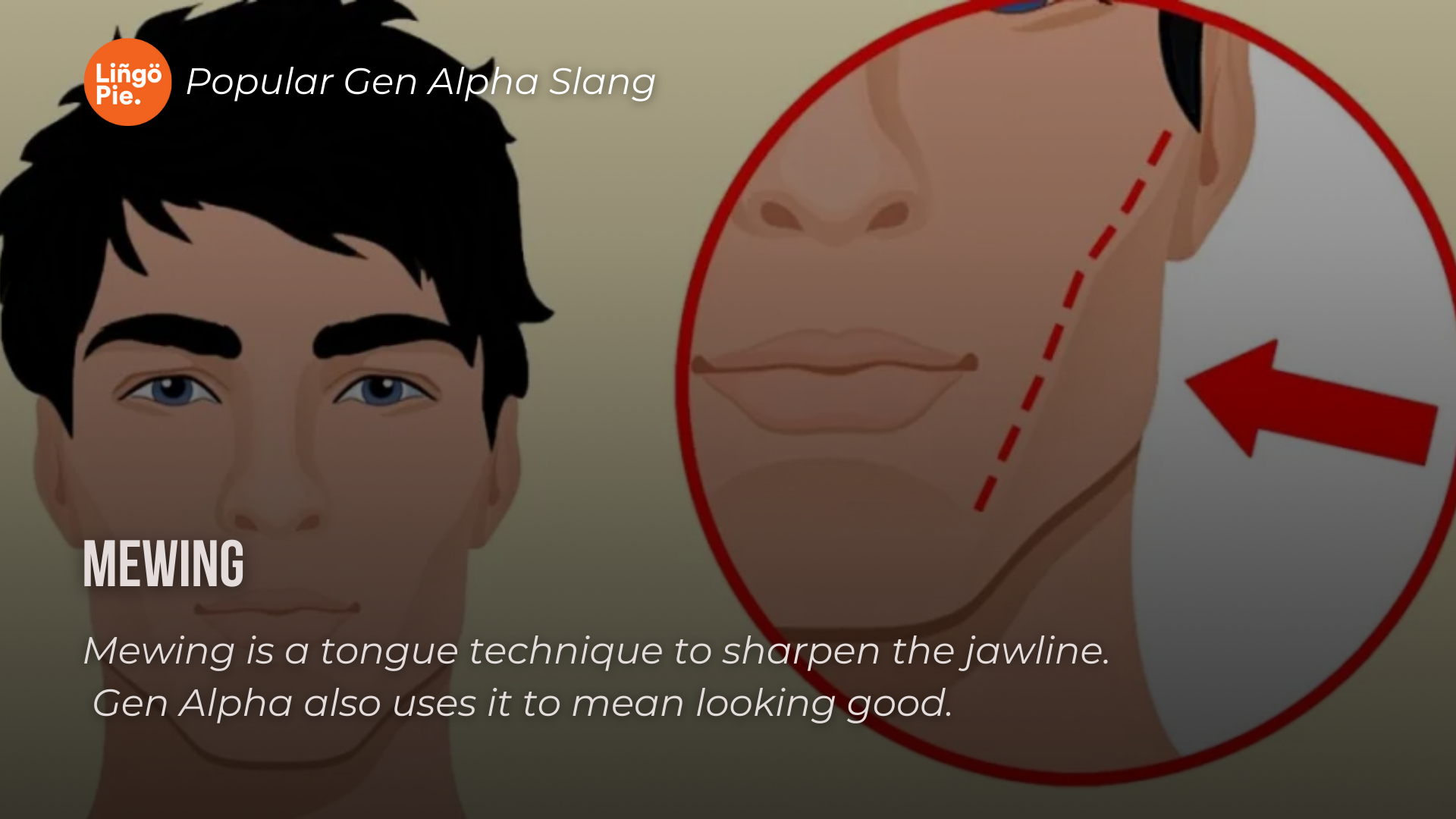
Mewing
Mewing refers to a technique in which one flattens their tongue against the roof of their mouth to try to define their jawline, though according to the American Association of Orthodontists, this method has not been proven to work. It's become a popular hobby among Alpha and Sigma males that trains their jawline to be sharp. Gen Alpha uses it both literally and as slang for looking good or trying to improve your appearance.
Example: "Your jawline is kinda weak lil bro, maybe you should talk less and start mewing."
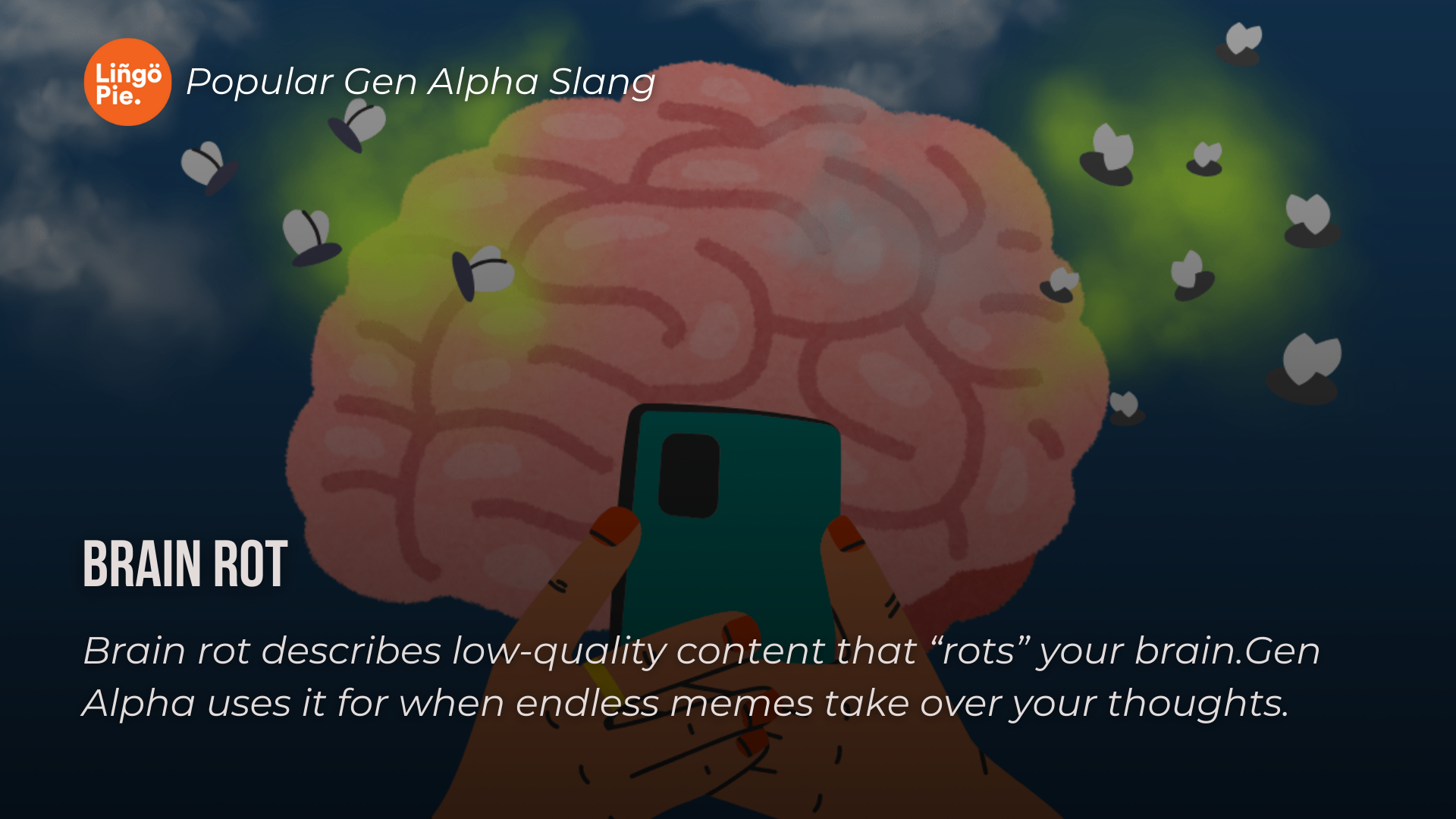
Brain Rot
Brain rot refers to low-quality content online that 'rot' your brain, and if your humor, speech, and daily thoughts revolve around one hyper-niche thing — welcome, you've got brainrot. Gen Alpha's hyper online manner of speaking has been dubbed "brainrot," mostly by older Gen Z'ers who share spaces like TikTok with them. It describes the phenomenon of consuming so much nonsensical internet content that you start randomly referencing memes.
Example: "I kept yelling flint and steel yesterday after watching the Minecraft movie, I might have brainrot."
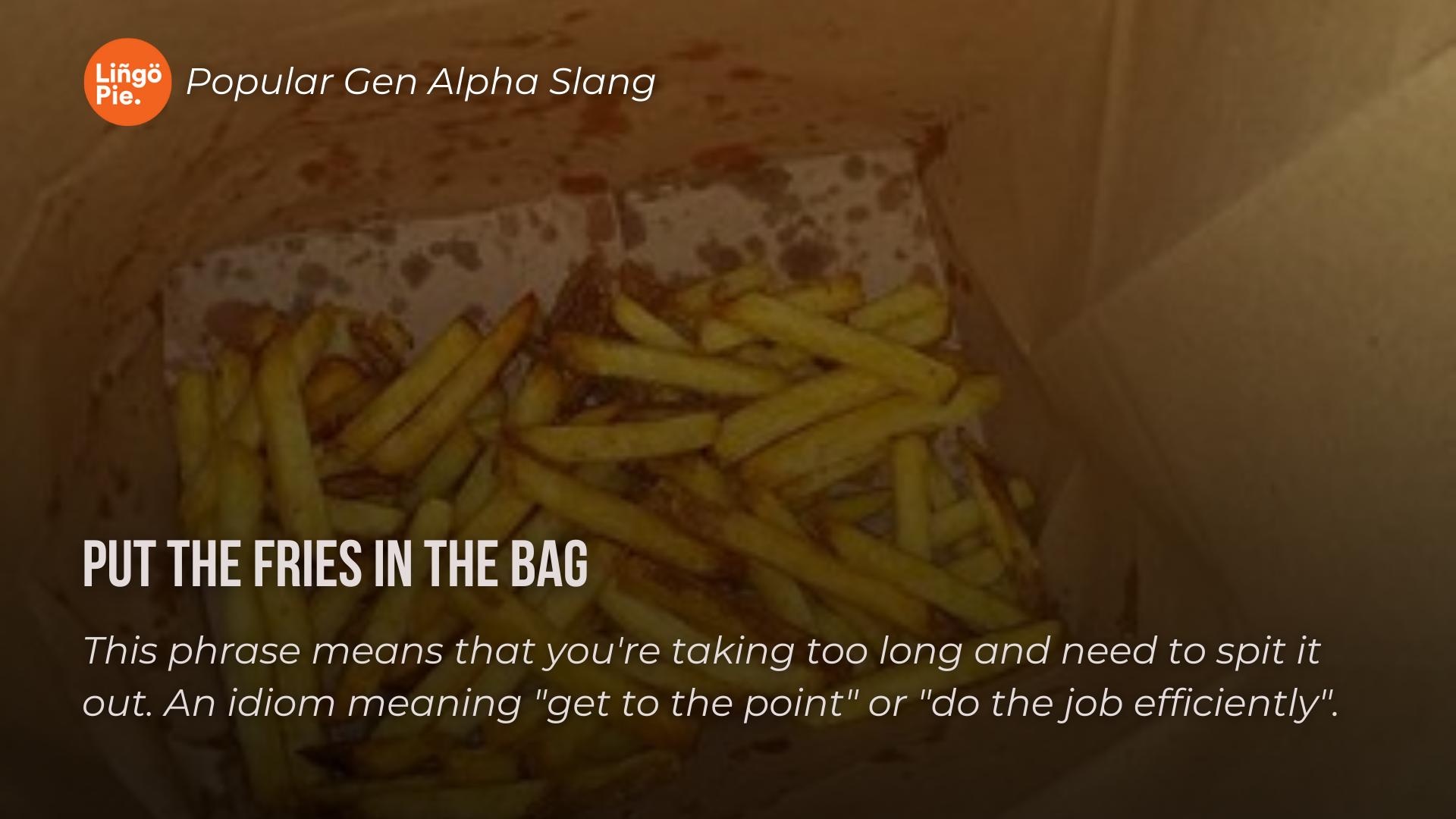
Put the Fries in the Bag
This phrase means that you're taking too long and need to spit it out. An idiom meaning "get to the point" or "do the job efficiently". It's used when someone is being unnecessarily complicated or wasting time instead of being direct.
Example: "That guy thinks he knows so much so I told him to just put the fries in the bag, bro."
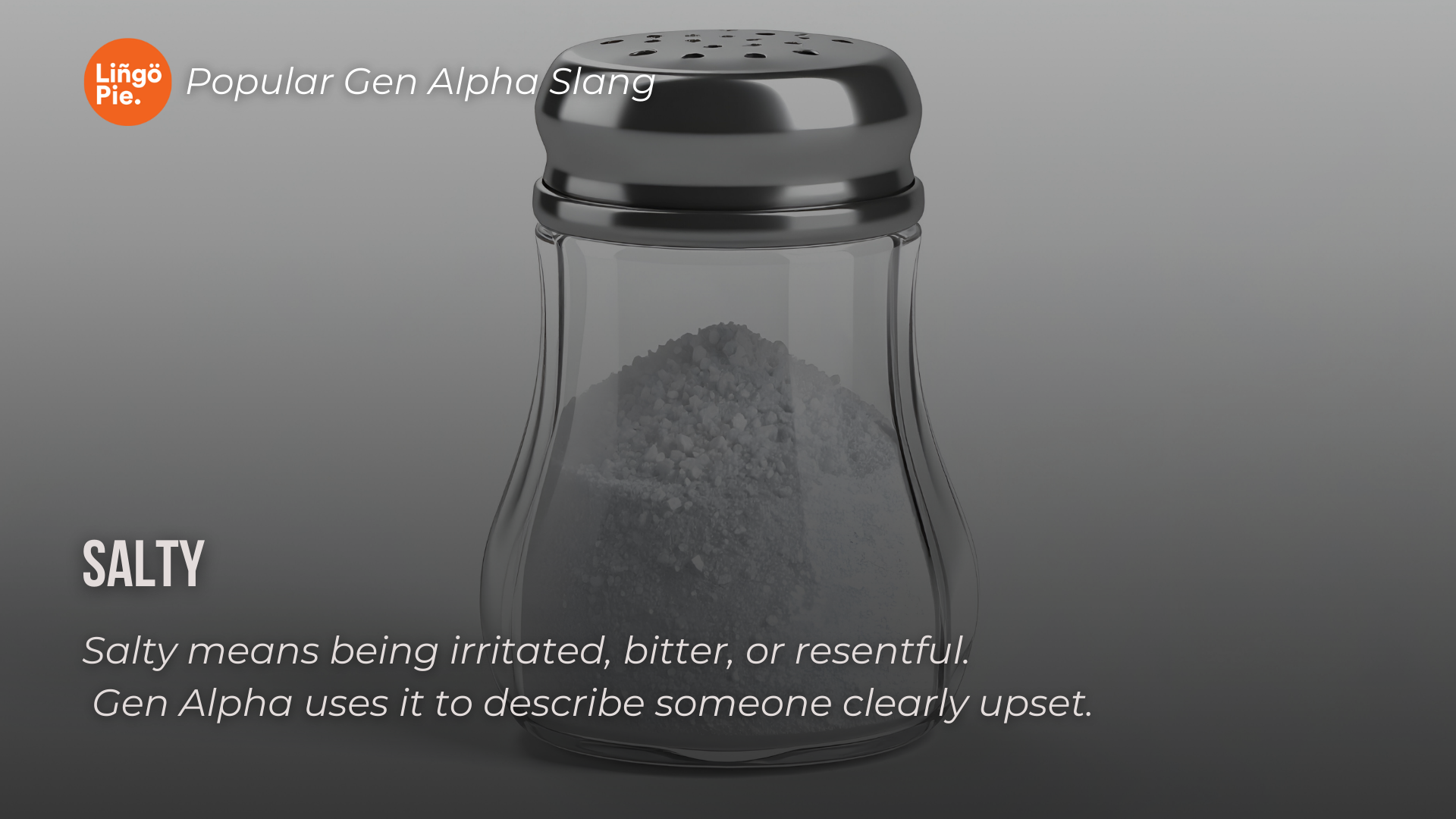
Salty
Salty describes being in a bad mood, irritated, bitter or resentful. It is used when someone is irritated or getting annoyed. This term actually predates Gen Alpha but has been fully adopted into their vocabulary for describing someone who's clearly upset about something.
Example: "Why are you being so salty about losing that game?"
Ate
Used to express admiration or praise for someone who has excelled at something, often with enthusiasm. The correct response is; "ATE", commonly used to praise or compliment someone who has done a good job or looks good. The Gen Z's might recognise this as the new form of "slayed" or derived from the phrase "she ate and left no crumbs".
Example: "Girl I saw your new nails! What's 4+4? ATEEEEEE!"
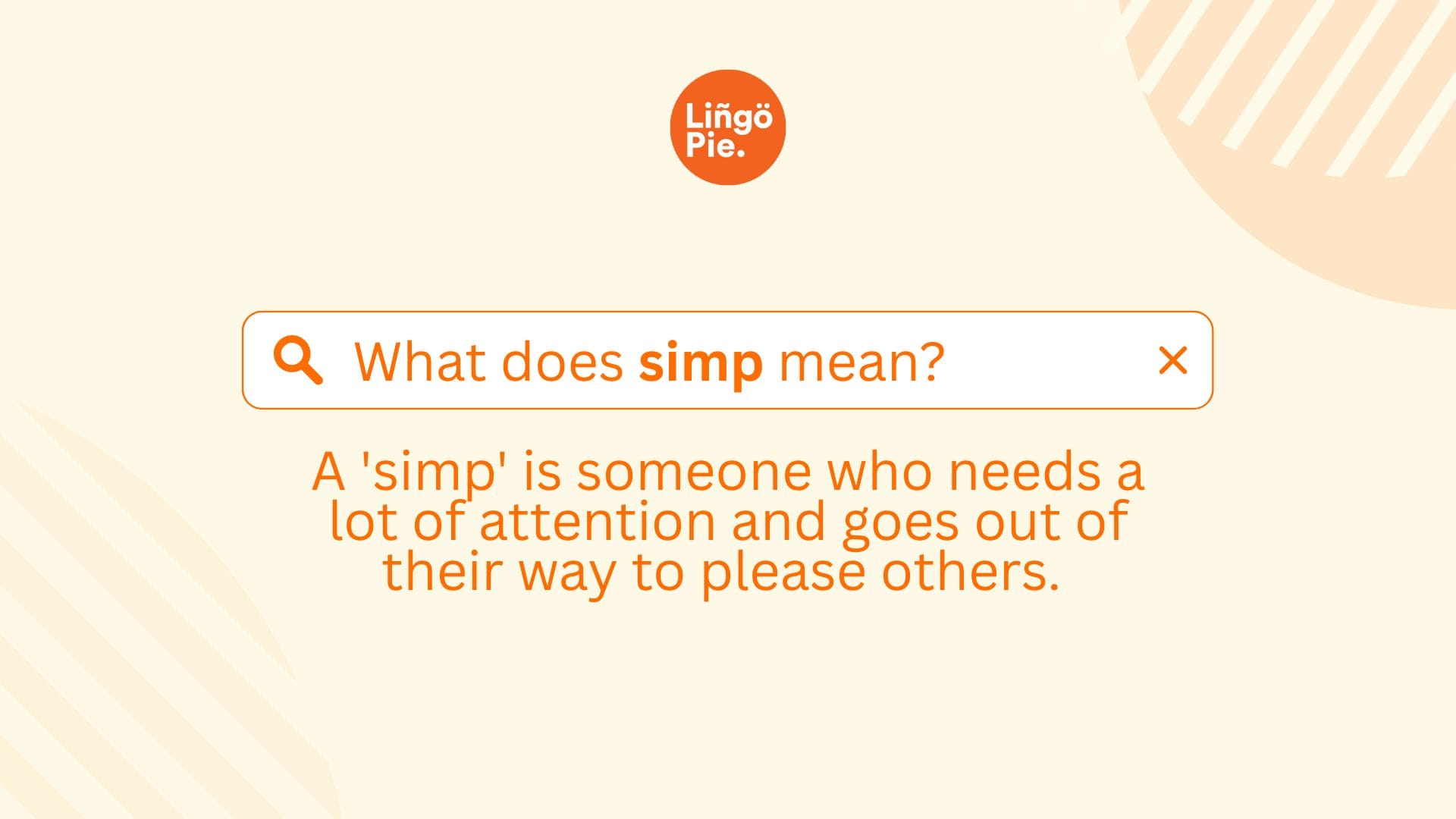
Simp
A 'simp' is someone who needs a lot of attention and goes out of their way to please others. Being overly eager to please or impress someone, often in a romantic context, sometimes to a self-deprecating extent. They are often over-submissive and do more than required for the validation of others.
Example: "Stop being such a simp, you don't need to buy her coffee every day."
Sheesh
Expresses surprise, disbelief, or admiration. Gen Z's definition of sheesh is hyping someone up. Gen Alpha's meaning is disbelief ("wow") or surprise. A word used to show surprise or that something is really impressive.
Example: "Sheesh, those shoes are fire!"
Glaze
Glaze is when you praise someone too much to the point of it being annoying or cringe. When someone is giving too much praise to someone else and it becomes cringe. It's basically Gen Alpha's way of calling out excessive flattery or brown-nosing behavior.
Example: "Stop glazing the teacher, we all know you didn't do the homework either."
Dog Water
You didn't do a good job or extremely bad. Used to describe something of very low quality. This term originated from gaming culture but has expanded to describe anything that's terrible, low-quality, or poorly executed.
Example: "Your TikTok dance moves are straight dog water, bro."
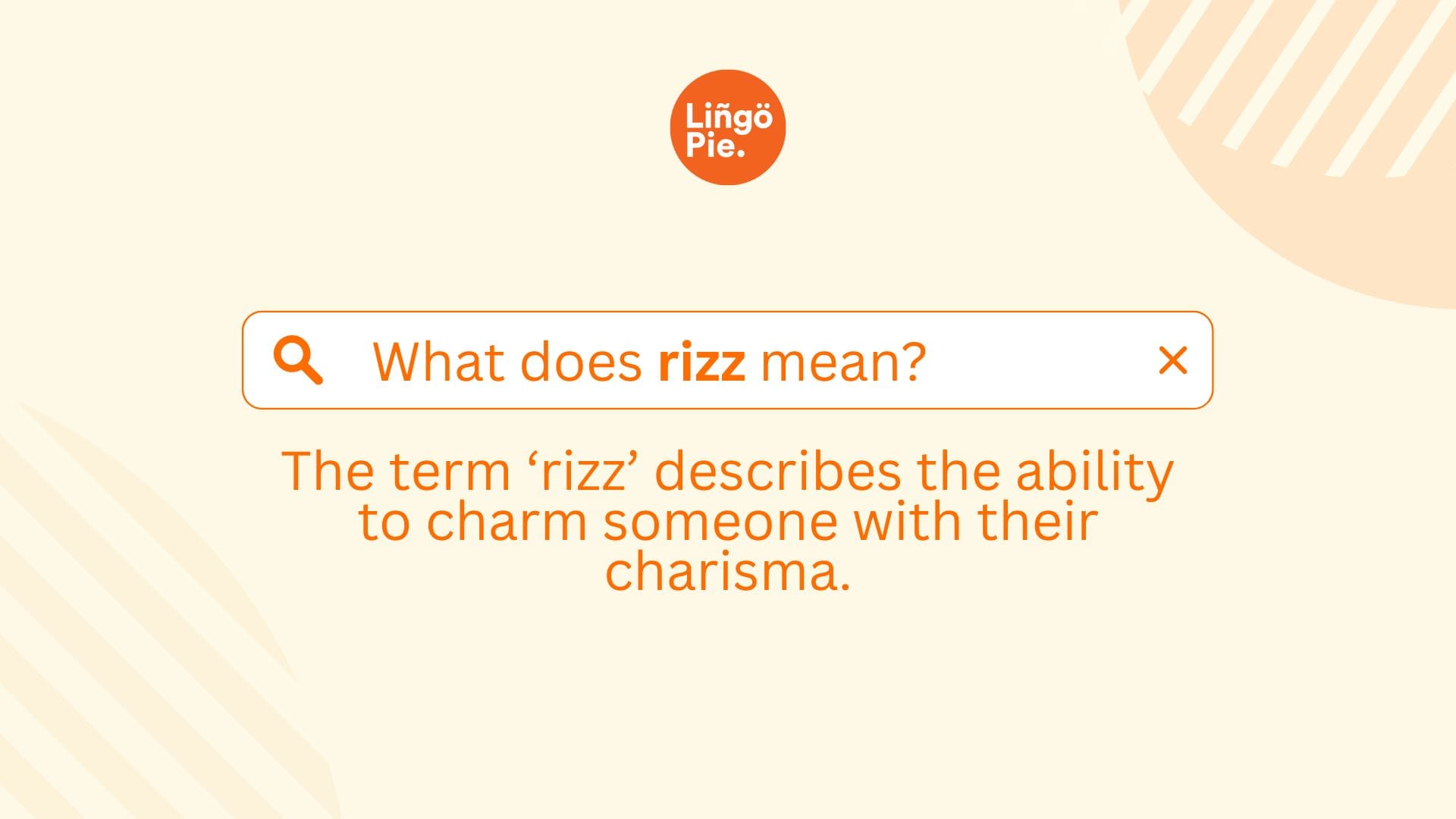
Rizz
"Rizz" is a term largely used by Gen Z and Gen Alpha and is a shortened version of the word "charisma." It describes the ability to charm someone. If someone has rizz it means that they are good at attracting romantic partners. Having rizz is making someone fall for you, and someone with exceptional rizz becomes a "rizzler."
Example: "Are you from Tennessee, cuz you're the only 10 I see'"
Gyat
Gyatt, put simply, refers to someone's butt. The word gyat is most commonly used when admiring someone's large and curvy bottom. Typically used as an exclamation. It's often shouted out as a reaction when someone with an impressive figure walks by, becoming one of the most recognizable Gen Alpha expressions.
Example: "GYAT! Did you see her walk by?"
Ohio
Basically, the term started in 2021 or 2022 as a meme when people started posting "crazy things" that occurred in Ohio. The essence of the meme was all the weird, cringy, wild stuff happens in Ohio. For the Gen Alpha, Ohio is a place where only flabbergasting and disturbing events take place.
Example: "That dog looks so weird, did you get it from Ohio?"
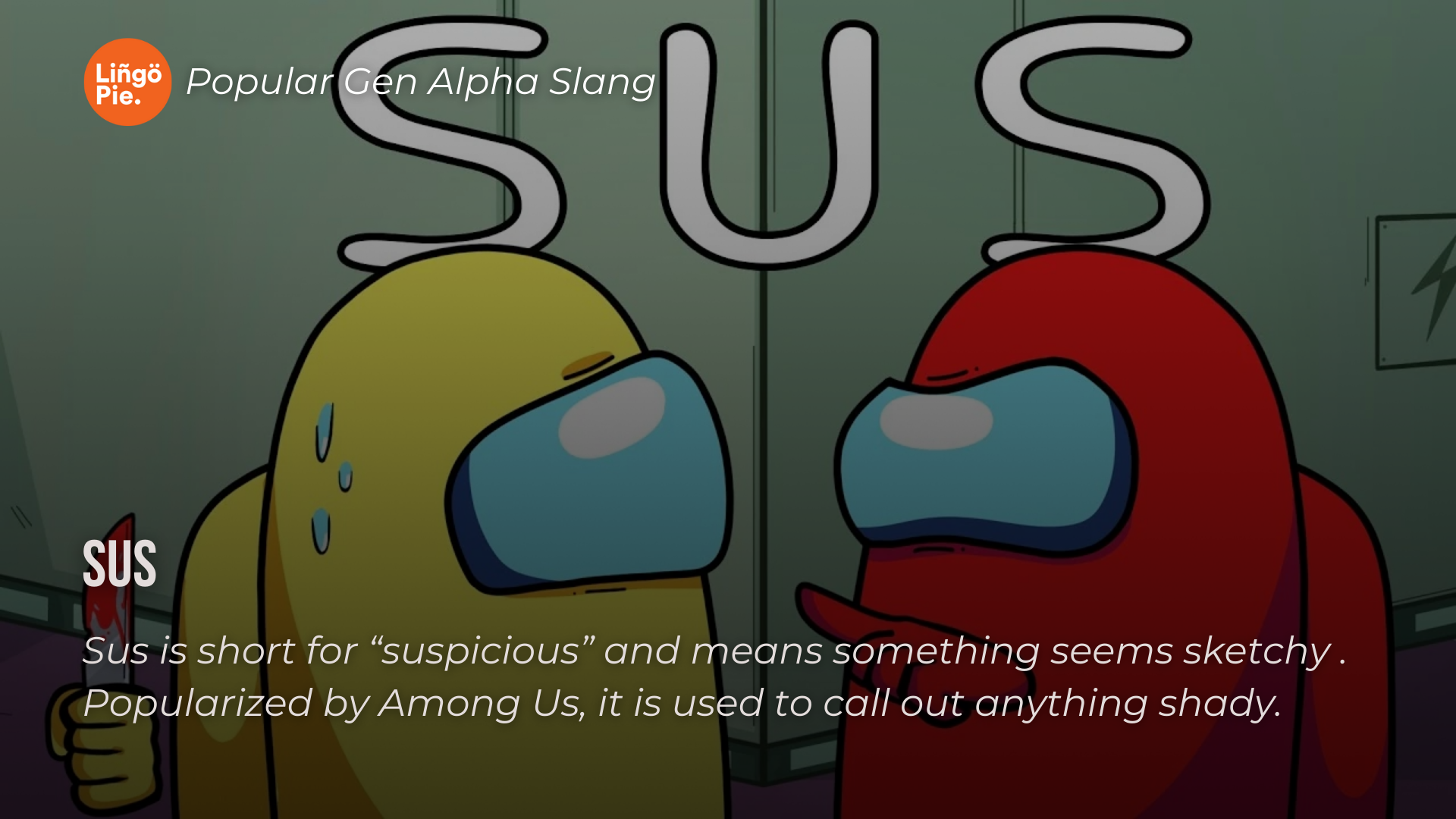
Sus
Sus is short for "suspicious" used to indicate doubt. This slang grew popular in the pandemic-era with its use in the game Among Us. However, according to Merriam-Webster, the word 'sus' has been around since the 1960s and has been commonly used by English speakers. Gen Alpha uses it to call out anything that seems sketchy or questionable.
Example: "He's been acting sus all day. I bet he's up to something."
No Cap
Cap is used for a lie or something that is not true. No cap, on the other hand, is used for something that is true or not lying. An older but still relevant term, cap means to lie. If you say "no cap," it means you are being authentic or truthful. It's Gen Alpha's way of emphasizing they're being completely honest.
Example: "That test was impossible, no cap."
Bet
The simplest definition of bet is to be in agreement with someone. It's like saying "OK" or "sure". Simply put, this slang term means "yes." It can be used to confirm something and could be compared to the Millennial term "word". It's become the go-to way for Gen Alpha to show agreement or acceptance.
Example: "Want to go to the mall later?" "Bet."
Sigma
A sigma is a male who is confident and dominant. This is the next level above an alpha male. Sigma males are independent, confident, non-conformist types who operate outside traditional social hierarchies. Some of the words, like "sigma," have transcended their first slang iterations and are now just a filler for basically anything.
Example: "What the sigma?" (used as random filler)
Drip
Another way of saying swag, drip is a term for a cool or sexy trend/style. Slang for stylish clothes or accessories. If someone has "drip," they have a cool or fashionable look. Gen Alpha uses this to describe anyone whose outfit or overall style is particularly impressive or enviable.
Example: "Your new sneakers have serious drip."
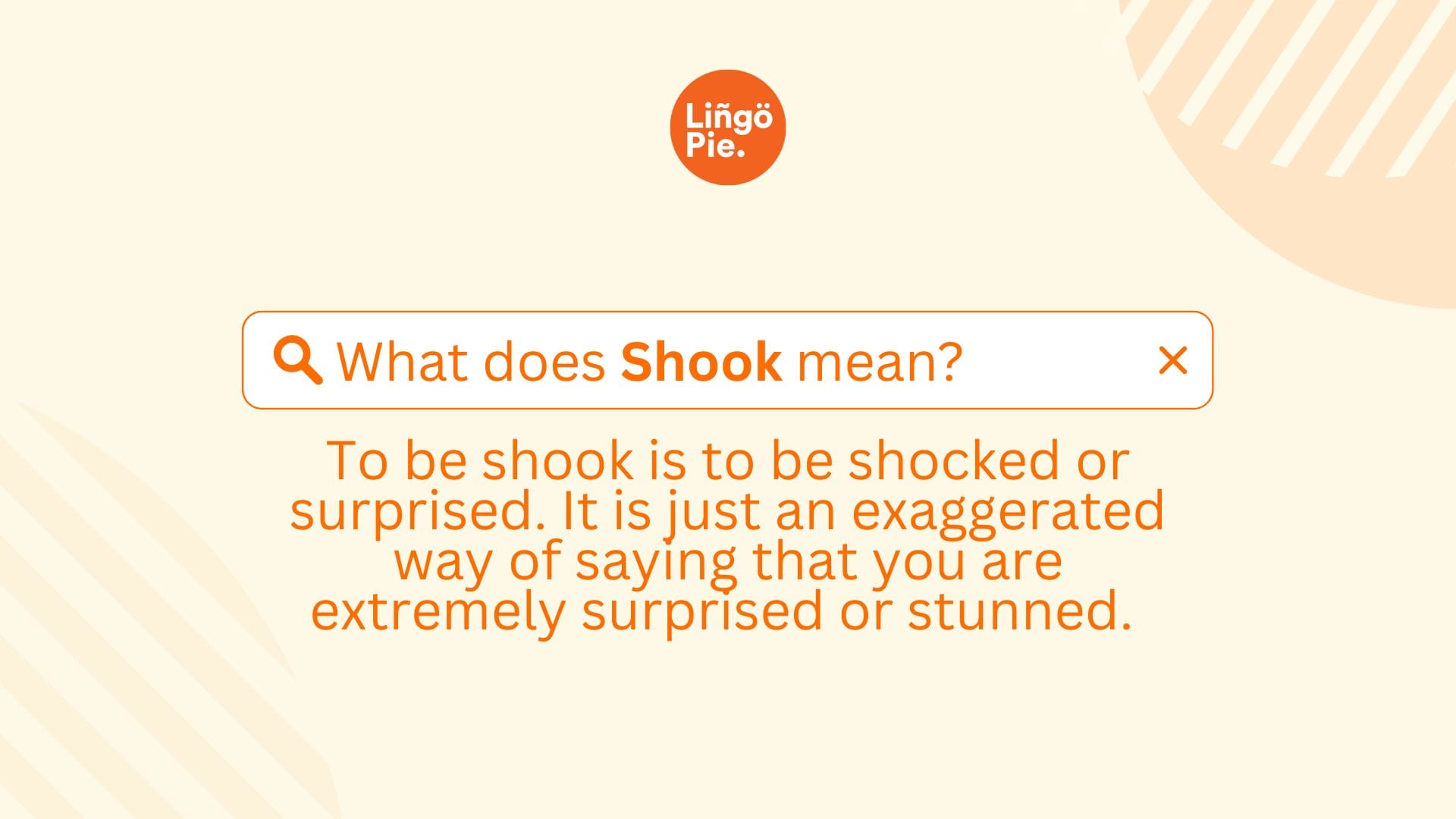
Shook
Surprised, shocked, or stunned. To be shook is to be shocked or surprised. It is just an exaggerated way of saying that you are extremely surprised or stunned. An exaggerated form is "shooketh," indicating being extremely surprised.
Example: "When I heard the news, I was shook."
Fire
Fire describes something that's excellent, impressive, or really good. While not explicitly defined in the search results, it's consistently used across Gen Alpha vocabulary to express enthusiasm about something cool, exciting, or praiseworthy. It's one of the more straightforward terms that crossed over from earlier generations.
Example: "Sheesh, those shoes are fire!"
Bussin'
Describes food that is exceptionally delicious. Something that's very good is bussin'. For example: This list is bussin'. Bussin isn't just for food anymore — Gen Z uses it for fits, music, makeup, vibes, and basically anything worth hyping.
Example: "These cookies are bussin'!"
Fanum Tax
Fanum Tax is one of the Gen Alpha slang words for which you'll definitely need a dictionary. It means stealing food from a friend. The term was made popular by Twitch streamer Fanum who has over 2.6 million followers and is part of Kai Cenat's group. "So the tax is pretty much ... feed your friends," he told GQ in November 2023.
Example: "You already Fanum taxed me, get your own food."
Cheugy
Cheugy is easily the most Gen Alpha thing to say. The term was conceptualized in 2013 and gained popularity in 2021. It is a word used to describe someone who is outdated or behind time when it comes to fashion or trends. Something that is cheugy is not at all trendy. Outdated, unfashionable, or uncool.
Example: "I can't believe she's wearing that cheugy outfit. It is so out of trend."
Skibidi
The slang word 'Skibidi' comes from the popular YouTube series called "Skibidi Toilet." The videos in this series are as weird as the word itself; most videos feature spinning heads of men, usually singing while in a toilet. Many of the Gen Alpha kids who use "skibidi" as part of their daily lingo still don't really know what it means.
Example: "Sticking out your gyatt for the rizzler / you're so skibidi" (from the viral TikTok song)
Final Thoughts
Understanding Gen Alpha slang can be both fun and useful, especially if you want to connect better with younger generations. As language evolves quickly, staying updated on the latest terms can help you communicate more effectively and keep up with the latest trends.
If you're looking for a way to keep up with new vocabulary and understand how it's used in everyday conversations, Lingopie is a great tool. It offers a wide range of content that features real-world language use, including TV shows, movies, and videos that showcase the latest slang and expressions.
Whether you're trying to understand younger generations or just enjoy learning new words, the right resources can help you stay updated in this ever-changing language world.
FAQs About Gen Alpha Slangs
What's The Difference Between Gen Z And Gen Alpha Slang?
While Gen Z and Gen Alpha share some similarities in their slang, there are key differences driven by digital culture's rapid evolution. Gen Z slang often reflects the early 2000s internet culture, shaped by platforms like Twitter and early Instagram. In contrast, Gen Alpha slang is heavily influenced by newer platforms like TikTok, YouTube Shorts, and emerging gaming trends.
How Often Does Gen Alpha Slang Change?
Gen Alpha slang changes incredibly quickly, often in response to viral trends, memes, and the rapid turnover of content on social media. As new slang emerges, a term might gain popularity and fade within weeks or even days.
Where Can I Learn More About New Slang Trends?
To stay updated on the latest Gen Alpha slang trends, consider following social media influencers, meme accounts, and language-focused communities on platforms like TikTok, Twitter, and Instagram. Websites like Urban Dictionary are also valuable resources for understanding slang's origins and meanings.


